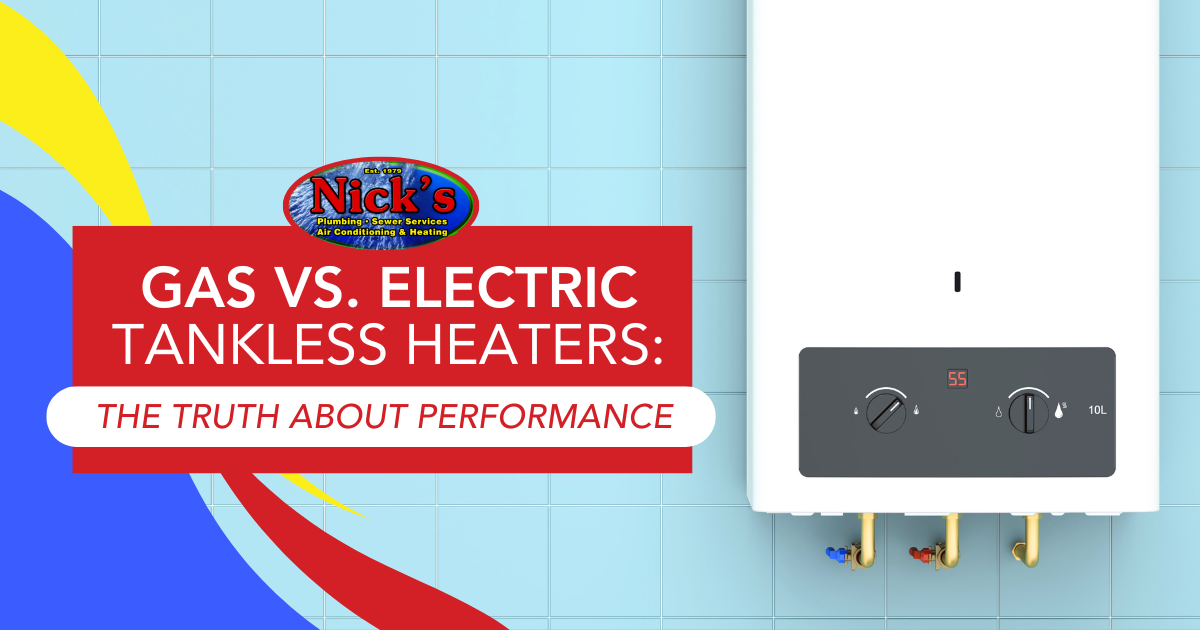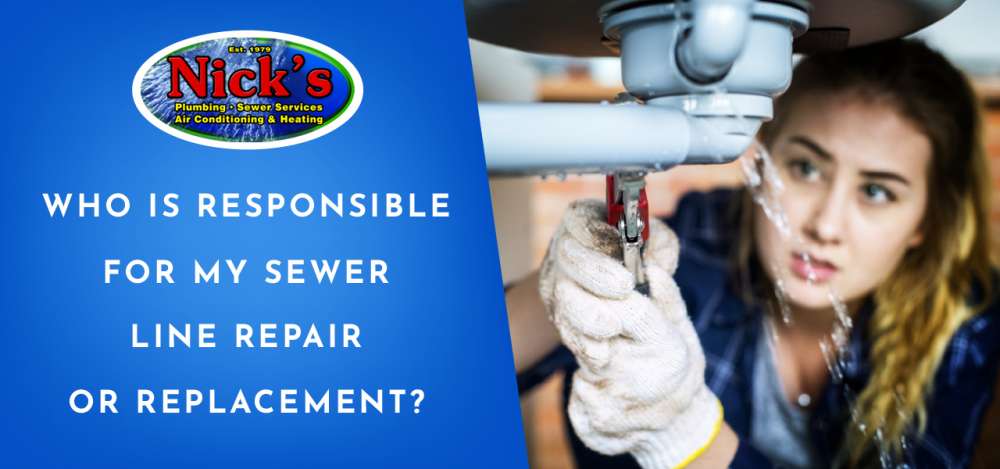Key Takeaways
-
Gas tankless water heaters deliver higher flow rates and better performance for large households and cold climates.
-
Electric tankless units are ultra-efficient, compact, and easier to install—ideal for smaller homes or point-of-use applications.
-
Regular maintenance will help with long-term performance, including flushing and descaling.
-
Professional installation from Nick’s ensures your water heater is safe, correctly sized, and code-compliant for your home.
If you’re in the market for a tankless water heater, chances are you’ve come across the great debate: gas vs. electric. Both types offer on-demand hot water, significant energy savings, and space-saving designs, but the way each one operates is quite different from the other.
Tankless water heaters perform differently depending on your home’s size, location, and hot water needs. In this post, we’ll walk through the pros, cons, and real-world performance differences between gas and electric tankless water heaters, without pushing one over the other.
Just the facts, so you can make the choice that works for you.
How Tankless Water Heaters Work
Regardless of which fuel source you choose to power your new tankless water heater, the concept behind tankless water heaters is the same. Cold water flows into the unit housing, where it’s instantly heated by passing it across a heat exchanger prior to being sent to your faucet or shower.
Unlike traditional water heaters, which store hot water in a tank, tankless models heat water only when needed. This on-demand delivery method reduces standby energy losses that occur when reheating the same tank of water for hours, thereby improving overall efficiency. The key difference lies in how that water gets heated—either with gas burners or electric heating elements.
Performance of Gas Tankless Water Heaters
When it comes to raw performance, gas tankless water heaters tend to outpace their electric counterparts, especially in homes with higher hot water demands. These units are capable of delivering flow rates between 5 and 10 gallons per minute (GPM), making them ideal for households where multiple fixtures may be in use simultaneously. Whether you’re running the dishwasher, taking a shower, or doing laundry all at once, a properly sized gas unit can keep up without breaking a sweat.
Gas tankless heaters also excel in colder climates, where incoming water temperatures can be extremely cold. Unlike electric models, which can struggle to raise the temperature of very cold water quickly, gas units use a powerful burner system that heats water more rapidly and consistently. This allows them to maintain performance even when groundwater temperatures are significantly lower during the winter months.
Another key performance advantage is their ability to ramp up instantly. Since gas burners ignite immediately when hot water is called for, there’s minimal lag between demand and delivery. And while it’s true that gas models burn fossil fuel, they only do so on demand, meaning there’s no energy waste from maintaining a tank full of hot water around the clock.
Performance of Electric Tankless Water Heaters
Electric tankless water heaters typically have lower flow rates, generally ranging from 2 to 5 GPM. This makes them well-suited for smaller homes, apartments, or point-of-use applications, such as under a kitchen sink. They’re not usually the best option for large families trying to run two or three showers at once, especially in colder climates where the colder incoming water temperatures require more heating power.
Still, electric models offer their own set of advantages. They’re typically more compact, don’t require venting, and are easier to install in tight spaces. When comparing the performance of electric and gas tankless models, electric units may appear slower to heat water under high demand.
Efficiency and Output Comparison
Electric tankless water heaters often excel in energy efficiency. With efficiency ratings of nearly 98%, they convert nearly all their energy into heat with minimal waste. And, because there’s no combustion or venting required, there’s also no heat loss through exhaust.
Gas tankless water heaters still offer much better efficiency than old tank-style heaters, but some energy is inevitably lost through the venting process. Their Uniform Energy Factor (UEF) usually falls between .81 and .96. While not as high as electric models, the higher output and faster heating speed often make that trade-off worthwhile for larger homes.
If you’re focused on tankless water heater energy savings, keep in mind that utility rates matter. In areas where electricity is cheap, electric units may come out ahead. But if natural gas is less expensive in your region, the difference in operating costs could tilt the scale in the other direction.
Maintenance and Longevity
Both gas and electric tankless water heaters can last 15 to 20 years or more with proper care, but regular maintenance plays a significant role in how long they’ll last. Gas units typically require more upkeep, including vent cleaning, burner inspection, and descaling due to mineral buildup.
Neglecting maintenance can lead to a drop in performance, higher energy bills, and premature system failure. Mineral buildup inside the unit, particularly in areas with hard water, can reduce heat transfer efficiency and lead to overheating. For gas units, failing to clean the burners or inspect venting can lead to incomplete combustion or carbon monoxide buildup.
Regular flushing, typically performed once a year, helps remove sediment and scale from the inside of the heat exchanger. Replacing filters and checking the electrical or gas components can catch small problems before they turn into major repairs. Homeowners who skip these steps risk voiding their warranty and shortening the life of their system.
Choosing the Right Tankless System for Your Home
So, which is better—gas or electric? That depends entirely on your home and how you use hot water. If you have a large household with high demand, a gas tankless water heater is likely your best bet. It offers faster heating and higher flow rates, which will keep everyone happy even during the morning shower rush.
On the other hand, if you live in a smaller home, are energy-conscious, or don’t need to run multiple hot water appliances at once, an electric unit will serve you just fine. They’re also a great fit for homeowners looking to simplify installation or minimize maintenance needs. Ultimately, comparing electric and gas tankless heaters involves weighing upfront costs, energy sources, and how you plan to use hot water on a day-to-day basis.
Importance of Professional Installation and Evaluation
Whether you’re leaning toward gas or electric, a professional evaluation isn’t just helpful—it’s essential. Tankless water heater installation goes well beyond hooking up a water line and flipping a switch. Gas units require careful consideration of gas line sizing and proper venting to prevent the buildup of dangerous combustion gases. Electric models, while simpler in some ways, often require a substantial electrical upgrade, including a new breaker or panel to handle the system’s power draw.
Nick’s Plumbing has installed hundreds of tankless water heaters across Houston, and we know exactly what to look for. Before making a recommendation, we evaluate your water usage patterns, your home’s layout, available energy sources, and even local permitting requirements. We take care of the technical details so you don’t end up with a system that’s underpowered, inefficient, or unsafe.
Let Nick’s Help You Find the Right Tankless Water Heater
When comparing gas vs electric tankless water heaters, there’s no one-size-fits-all answer. Both have their strengths and a few limitations. What matters most is understanding your household’s water needs, your local utility rates, and the climate you live in.
Nick’s Plumbing has been serving Houston homes for over 45 years, providing honest advice and expert installation. If you’re unsure which tankless system makes sense for your home, let us help you sort through the options and install a solution that fits your lifestyle, budget, and long-term goals. Give us a call today, and together, we can make sure you never run out of hot water again.


























